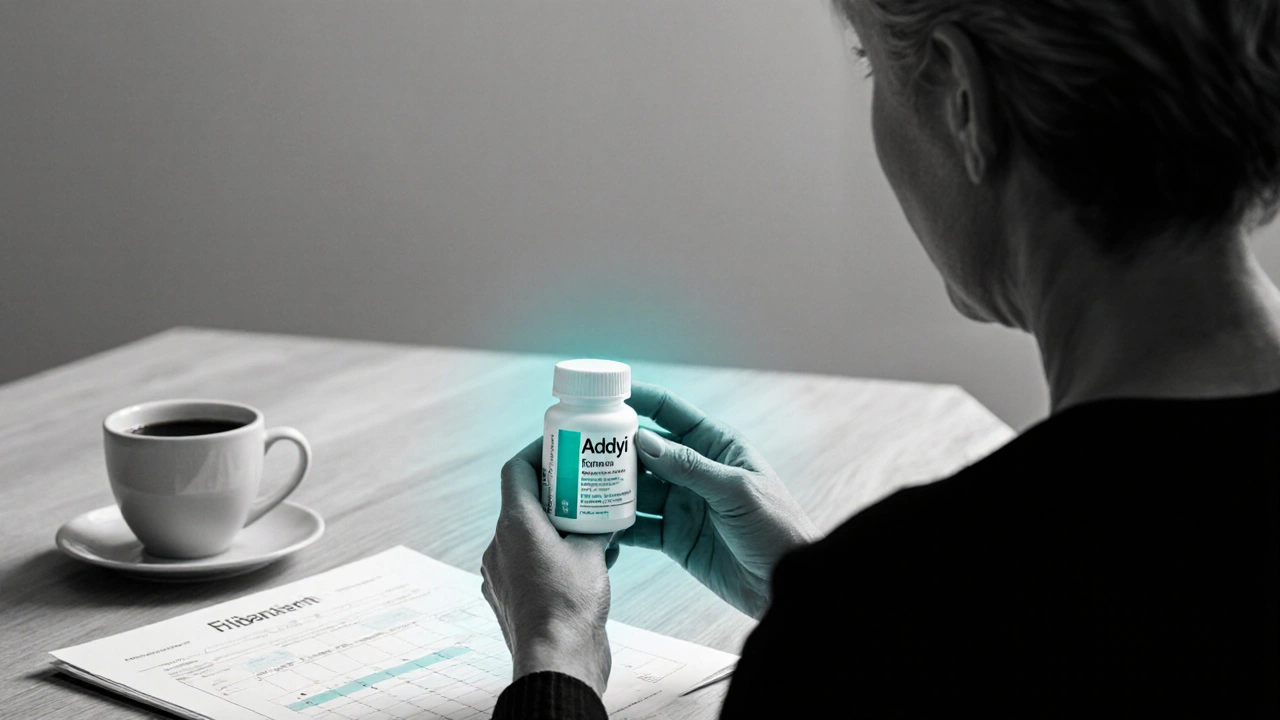Flibanserin Weight Loss Calculator
Weight Loss Comparison Tool
Based on clinical trial data from the article, compare expected weight loss from Flibanserin versus approved weight loss medications.
Weight Loss Results
Enter your weight and select a medication to see results
Key Data from Clinical Trials
| Medication | 24-Week Weight Loss | Significant? |
|---|---|---|
| Flibanserin (Addyi) | ~0.2% of body weight | No |
| Bupropion/Naltrexone | 5-9% of body weight | Yes |
| Phentermine-Topiramate | 9-10% of body weight | Yes |
When you hear the word Flibanserin, the first thing that probably comes to mind is its use for low sexual desire in women. But a handful of headlines have hinted at a surprising side effect: weight loss. Is there any real connection, or is it just wishful thinking? This article unpacks the biology, looks at the data, and gives you a clear answer.
What is Flibanserin?
Flibanserin is a prescription medication approved by the Food and Drug Administration (FDA) in 2015 for the treatment of hypoactive sexual desire disorder (HSDD) in pre‑menopausal women. The drug is sold under the brand name Addyi and is taken daily as a low‑dose tablet.
How Flibanserin Works
Flibanserin’s primary action is on the brain’s neurotransmitter system. It acts as a serotonin2A receptor agonist and a dopamineD4 receptor antagonist, while also influencing norepinephrine. In plain terms, the drug nudges the balance toward more dopamine and norepinephrine-chemicals linked to sexual arousal-and away from serotonin, which can dampen desire.
Weight‑Loss Theory: Where the Idea Comes From
Because serotonin also regulates appetite, some researchers wondered whether reducing its activity might curb cravings. The hypothesis goes like this:
- Flibanserin lowers serotonin activity in certain brain regions.
- Reduced serotonin could lead to decreased appetite or altered food reward pathways.
- Those changes might translate into modest weight loss over weeks or months.
In addition, dopamine and norepinephrine are involved in energy expenditure and motivation to exercise, so a shift in their levels could theoretically boost metabolic rate.

What Clinical Studies Actually Show
To move beyond theory, we need data. Six major clinical trials-collectively involving about 6,500 women-evaluated Flibanserin’s efficacy for HSDD. None of those trials were designed to assess weight change, but researchers reported weight as a secondary outcome.
The pooled analysis revealed a mean weight difference of‑0.2kg (‑0.4lb) between Flibanserin and placebo after 24weeks-well within the margin of measurement error. Sub‑group analysis of participants who reported a baseline BMI≥30kg/m² showed a slightly larger mean loss of‑0.5kg (‑1.1lb), but again, the effect was not statistically significant.
In 2023, a small open‑label pilot (n=45) explored Flibanserin’s impact on appetite hormones such as ghrelin and leptin. The study found no meaningful changes, suggesting the drug doesn’t meaningfully modulate the hormonal drivers of hunger.
Comparing Flibanserin to Approved Weight‑Loss Drugs
For perspective, let’s line up Flibanserin next to two FDA‑approved weight‑loss medications: Bupropion (combined with naltrexone) and Phentermine‑Topiramate. The table below captures key metrics from pivotal trials.
| Drug | Mechanism | Average % Body‑Weight Loss | Common Side Effects |
|---|---|---|---|
| Flibanserin | Serotonin2A agonist / DopamineD4 antagonist | ~0.2% (not significant) | Dizziness, nausea, fatigue |
| Bupropion/Naltrexone | Reward‑pathway modulation (dopamine & opioid antagonism) | ~5-9% | Nausea, headache, insomnia |
| Phentermine‑Topiramate | Appetite suppression + increased satiety | ~9-10% | Dry mouth, constipation, tingling |
Even the most modestly effective approved agent (bupropion/naltrexone) outperforms Flibanserin by a wide margin. The takeaway? Flibanserin isn’t a weight‑loss tool.

Practical Takeaways for Patients and Providers
- Expect no meaningful weight loss. The pharmacology targets sexual desire, not appetite.
- If weight management is a primary goal, discuss FDA‑approved options or lifestyle interventions.
- Monitor common Flibanserin side effects-especially dizziness and hypotension-rather than focusing on the scale.
- Women with a BMI≥30kg/m² should not be prescribed Flibanserin solely for weight control.
- Future research may explore combined regimens, but current evidence does not support off‑label use.
Frequently Asked Questions
Does Flibanserin cause weight loss?
Clinical data show a negligible change in weight-about 0.2kg on average-which is not statistically significant. In short, no, it does not cause meaningful weight loss.
Why do people think there’s a link?
The link stems from Flibanserin’s impact on serotonin, a neurotransmitter involved in appetite regulation. Media headlines often extrapolate that connection without solid trial evidence.
Can I use Flibanserin to aid my diet?
No. Prescribing Flibanserin off‑label for weight loss is not recommended, as the drug offers no proven benefit and carries risks like dizziness and low blood pressure.
Are there any weight‑loss drugs that work through serotonin?
Some older agents, such as lorcaserin, targeted serotonin2C receptors for appetite suppression, but they have been withdrawn from the market due to safety concerns.
What should I discuss with my doctor if I’m concerned about weight?
Bring up any weight‑management goals during your HSDD consultation. Your provider can recommend evidence‑based strategies-diet, exercise, behavioral counseling, or approved weight‑loss medications-rather than relying on Flibanserin.

